 We like to have a visual element to our High Fives, and we like to feature the work of as many gig photographers as we can, not just our own resident snapper. We’re hoping to feature some guest photographers later this month but, in the meantime, we’ll start with five from Allan because he’s got five ready to go. Here’s what he has to say about this year:
We like to have a visual element to our High Fives, and we like to feature the work of as many gig photographers as we can, not just our own resident snapper. We’re hoping to feature some guest photographers later this month but, in the meantime, we’ll start with five from Allan because he’s got five ready to go. Here’s what he has to say about this year:
There was a time earlier this year when I wondered if I’d have enough pictures for this feature. This was supposed to be a great year for gigs and January, February and the first half of March was living up to the promise; loads of gigs around London, a weekend mini-festival in Fife and my first shoot at the legendary Fairfield Halls in Croydon. A week after the Croydon gig, we were in lockdown. I was lucky enough to squeeze in a few gigs between lockdowns but let’s just say I won’t be doing a calendar this year. I normally shoot a lot of portrait-style shots with one person in the frame, but for various reasons, including avoiding brother/sister fallouts, I’ve shot a few group shots this year. Here’s a few of them:
The Velveteen Orkestra
I photographed Dan Shears at a John Lennon 79th birthday gig at The Hard Rock Café in 2019 and following on from that, we arranged to do some shoots at upcoming gigs in 2020 with a variety of Velveteen Orkestra line-ups. The second shoot I went along to was an early evening gig at Jamm in Brixton with Dan and violinist Sarah Boughton. I got lots of good solo shots of Dan, but having Sarah out of focus in the background gave some depth to this shot.
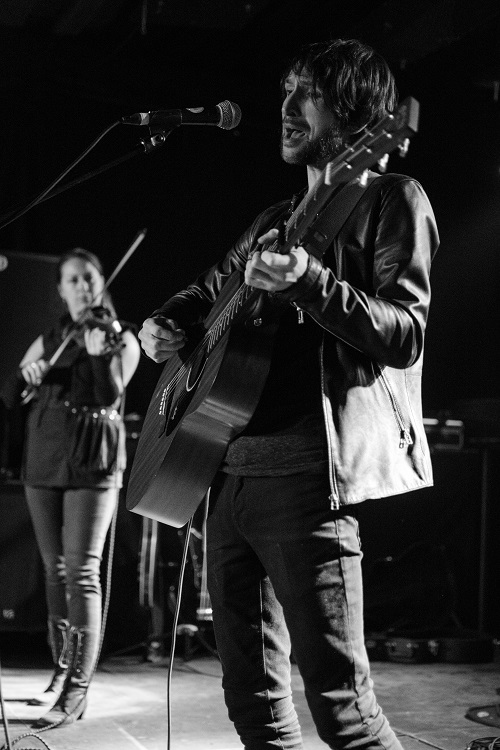
Amy LaVere & Will Sexton
What could be better than dashing around between venues in Hackney for two nights at the end of January. This was the annual Americana Music Association UK showcase 2020; it needed careful planning, stamina and shoeleather, but there were good shots to be had if you were fast and lucky. Amy LaVere and her husband Will Sexton were individually photogenic, but I was keen to get both of them in the frame. Amy draws the attention by staring straight at the camera, as Will plays the supporting role. If you want to know why this was a black and white shot, it was down to some flat and not very colourful lighting.
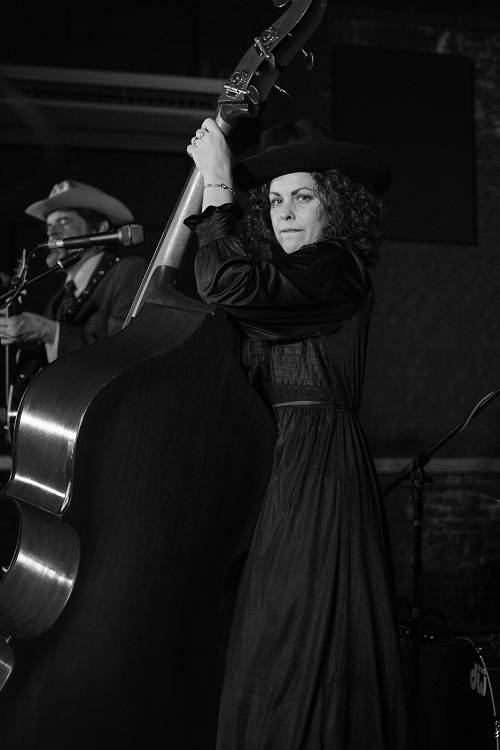
Belle Roscoe on a barge
I love shooting Belle Roscoe. They’re a brilliant band and, like the Velveteen Orkestra, they play in a variety of configurations from a duo format to full rock band. Whatever the format, they’re great to listen to and always interesting to shoot. Coming out of lockdown, I shot them at The Bedford in Balham and a few days later they announced a series of guerrilla outdoor gigs on a barge on a Saturday afternoon starting at Hackney Wick. After mistaking the River Lee for the canal and getting totally lost (and horribly late), I finally found the location for the first gig just as the band moored the barge to set up for the gig. As always, the band rocked and there were a lot of interesting shots there for the taking. I think the shot captures the strange setting, the cold and windy weather and the rock star quality of Julia and Matty Gurry.
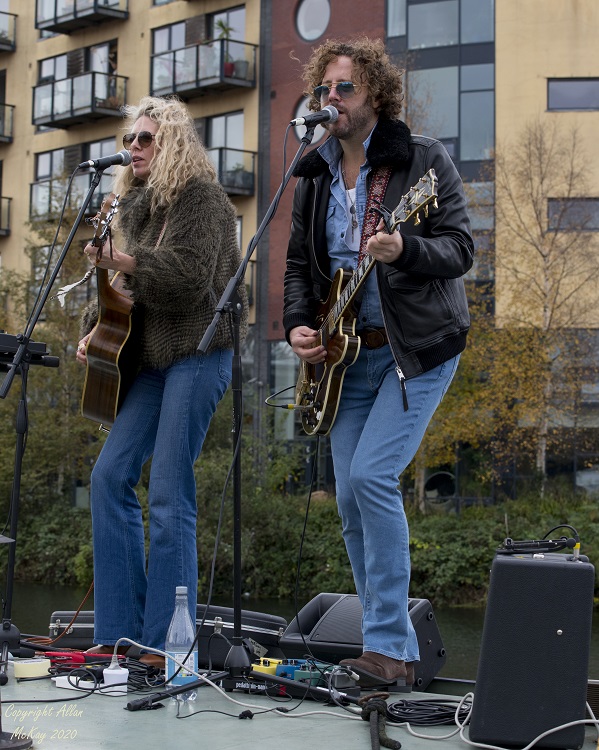
Dean Owens, Hannah-Rose Platt and Rab Noakes
This was a couple of weeks before lockdown. I had train tickets booked months in advance and fingers firmly crossed that the UK wouldn’t grind to a halt before the event. It was a weekend at The Woodside in Aberdour curated by the fabulous Scottish singer-songwriter Dean Owens celebrating Johnny Cash’s roots in The Kingdom of Fife. The weekend featured a wide variety of artists including Fay Fife and my favourite crime novelist, Ian Rankin.
My favourite session of the weekend was a songwriters’ circle on the Saturday evening featuring Dean, Hannah-Rose Platt and Scottish folk legend Rab Noakes. They complemented each other perfectly and I was positive that there was a good shot coming at the end of the set, so I got myself into position and waited.
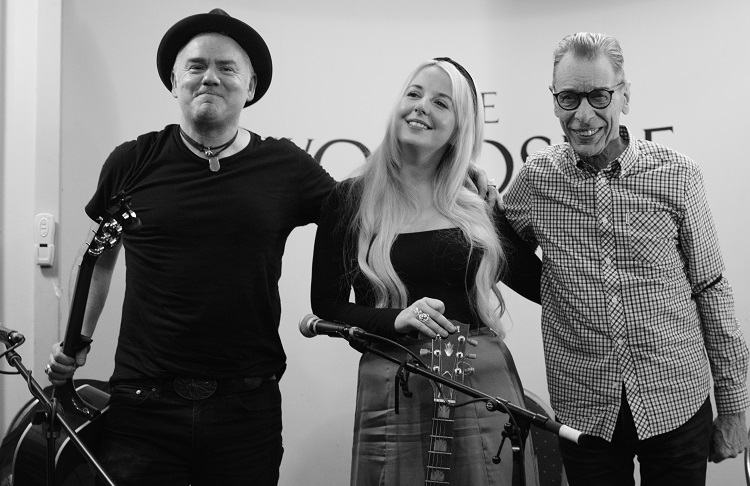
Georgia and the Vintage Youth
Just before the first lockdown again, this was a bit closer to home, at Paper Dress Vintage in Hackney. The gig was an EP launch and Georgia had the full band for this one. I have to say now that this is probably my favourite shot of the year. It was almost at the end of the set and I’d packed away the zoom and just kept the 35mm lens ready for any close-ups that might happen. It got interesting when Georgia sat down on the stage, got more interesting when guitarist Charlie Manning got in on the act, and absolutely perfect when Georgia flicked the ‘V’. It’s not technically perfect, but I love the Sid and Nancy/Kurt and Courtney feel of it.
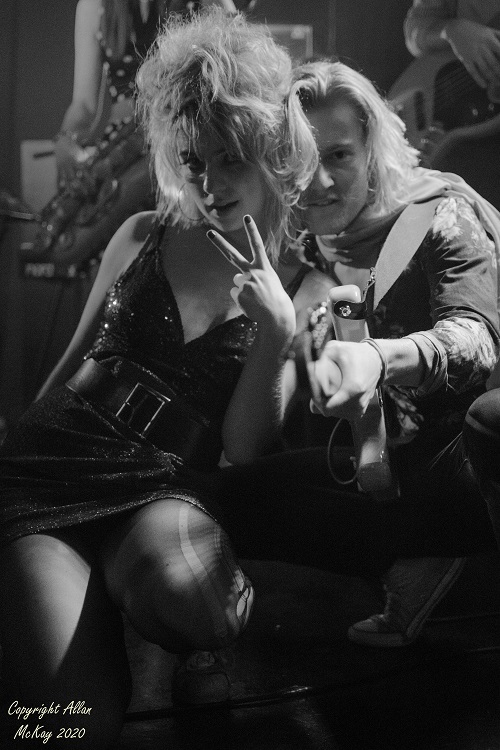
So, here we go with the first of our guest contributions to this year’s High Fives. Phil Burdett is a singer-songwriter from Essex whose album “Dunfearing and the West Country High” was one of Allan’s top 5 albums for the year. He’s a very entertaining interviewee and he’s a great guy to have a beer (or several) with. Anyway, here are Phil’s favourite five musical events of 2014:
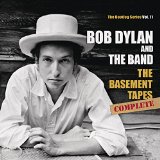 Release of Bob Dylan’s complete “Basement Tapes” Read more
Release of Bob Dylan’s complete “Basement Tapes” Read more
So, purely in alphabetical order (by album title) because there’s no way I’m trying to rank these in order of preference. They’re all very different and I can recommend any one of them to any real music fan; these are my five favourite albums of 2014.
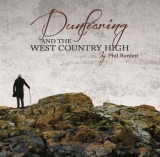 “Dunfearing and the West Country High” – Phil Burdett
“Dunfearing and the West Country High” – Phil Burdett
Phil Burdett’s latest album (on Drumfire Records) was a complete surprise for me. I’d heard Phil play a solo acoustic set a couple of years ago on a night out with the Riot Squad, but this was a completely different beast. “Dunfearing…” is the first part of the “Secular Mystic” trilogy, which should be completed with the release of parts two and three in 2015. It’s an album that sounds gorgeous; you could just sit and let its mix of folk, rock, country and a bit of jazz wash over you, but a little bit of extra effort and careful listening brings out all of the detail that Phil and the musicians have packed in to it; and there’s a lovely tribute to the late Jackie Leven. After reviewing the album, we also managed to grab an interview with Phil during the summer, which is a fascinating insight into a great songwriter.
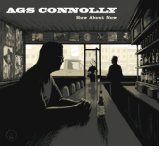 “How About Now” – Ags Connolly
“How About Now” – Ags Connolly
By sheer coincidence, also on Drumfire records, was the debut album from Ags Connolly, “How About Now”, which is now also available in a lovely limited edition vinyl pressing. Ags is based in Oxford but his roots are deep in the American South and his genre is a country offshoot known as Ameripolitan. He takes the outlaw attitude of artists like James Hand, Willie Nelson, Johnny Paycheck et al and gives it a personal twist with some very poignant songs. The album was produced in Edinburgh by his Drumfire labelmate, Dean Owens, and works well with full country band arrangements as well as the powerful solo acoustic guitar backing of the closing song “How About Now” (which was a genuine one-take recording).
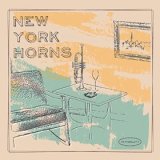 “New York Horns” – New York Horns
“New York Horns” – New York Horns
I know; you’re surprised that I’ve picked a jazz album. Truth is that I love to hear a good horn section, and most horn players away from the day job like to stretch themselves with a bit of jazz. The horns in question are John Isley (saxophone), Chris Anderson (trumpet) and Neal Pawley (trombone), better known as the horn section of The Asbury Jukes, aided and abetted by Jeff Kazee (keys) and Glenn Alexander (guitar). There isn’t a bad, or even a mediocre track on the album and with moods ranging from the blues of “Strollin’ with Sean” through the evocative, mellow “Morningside at Midnight” to the 24-carat soul of “Can’t Stand to See You Cry”, there’s something for everyone.
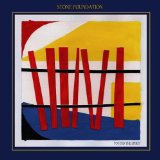 “To Find the Spirit” – Stone Foundation
“To Find the Spirit” – Stone Foundation
And continuing on the soul theme, how about some genuine home-grown English West Midlands soul? Stone Foundation has been steadily building up a devoted following for about ten years now, but “To Find the Spirit” may turn out to be the game-changer for them. The band takes influences from all over the soul spectrum to create a sound very much of this century but which appeals to very disparate groups of fans. The album grabbed me from the first few bars with the Hammond and horns intro of “To Find the Spirit” and impressed from start to finish. After 10 months (and seeing the band live three times), the standout song is definitely “Don’t Let the Rain”, driven along by Neil Sheasby’s slinky bass groove but, again, there’s no filler here.
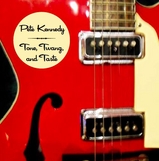 “Tone, Twang and Taste” – Pete Kennedy
“Tone, Twang and Taste” – Pete Kennedy
Now the reason this one’s here is that Pete Kennedy (one half of one of my favourite groups, The Kennedys) decided to pay tribute to the pioneers of the electric guitar prior to the rock ‘n’ roll era; the guys who had grab the interest by using technique and melodic invention rather than volume and a thudding 4/4 beat. Pete is a superb technical musician and “Tone, Twang and Taste” is so obviously a labour of love; every song is played with immaculate attention to detail and they all sound like they were great fun to do, particularly Pete’s ukulele version of “Rhapsody in Blue”. The commercial possibilities for this album were always very limited, and that’s one of the reasons I admire Pete so much for producing something that made me smile from start to finish.
You can read the original reviews of these albums on the site complete with all of the links to the songs on Spotify or Youtube; just type the title into the search box and you’re away. Go on, have a listen; they’re all great albums.
AM – Just looking around Leigh as an outsider, it always seems to have had a bit of an artistic vibe to it; do you get that?
PB – I’m torn on this idea; if you asked me where I would love to have lived it would probably be Greenwich Village but I’m not sure that that’s a good thing. You sometimes come from hick towns and you get the mavericks and the big fish in little pools but I’m not really sure that it matters at the end of the day. Obviously New York is a great residence simply because so many great writers came from there but if Lou Reed was born in Leigh-on-Sea what would he have written about?
AM – There’s no CBGBs here is there?
PB – Well there isn’t, but it would have been interesting, and vice versa; you get parochial writers who, well, what would they have done if they’d gone to town? I’m not sure it’s important; it’s certainly relevant, where you come from and where you write about. I don’t think it’s a prerequisite of something good. You can get blood out of a stone; you can, you’ve just got to try hard. Sometimes you’re swamped; now, having written from a local area that isn’t particularly bohemian, if I now went to New York, I’d probably overwrite everything and it would just be a mass of input and no way of filtering it. Which would be great; I’d love to do it if anyone’s got an apartment in New York.
AM – And that kind of leads in to “Dunfearing…”, which is the first part of a trilogy.
PB – I’m fond of these things; I get a lot of stick for it.
AM – It’s obvious that that there’s a tremendous sense of place in it. It’s a very West Country thing.
PB – The rest of the trilogy won’t be. You were probably the only person that picked up on the idea of approaching America as the only possible escape after the end of England; the only place you can go. That’s developing a little bit and the other two parts of the trilogy are written and I’m sorting out the third one but it’s more about how you escape the idea of getting old and the only way to do it is to reinvent a youth, which never really works and the idea of America is that it’s supposed to be the land of eternal youth no matter what age you go, so there’s a cynical angle to it as well but I hope that it’s more hope than cynicism: pragmatism.
AM – Do you think that the way the music business has gone over the last twenty years has allowed people like you to do what you want to do?
PB – No, I don’t. I actually think the music business is poorer for what’s happened to it. I would rather be struggling to sign to Warner Brothers, in a way. There’s a philosophy now that anyone can do anything they like, they can record it in their bedroom and make an album, which is fine, because the punk ethos is fine, but there is a difference. Yes, someone could thrash away at three chords and sing ‘I hate Margaret Thatcher’ and be played on John Peel; fabulous, but that was it. Now there seems to be a corporate mentality attached to do-it-yourself.
AM – It’s so difficult now, with music, to actually make any money.
PB – Which is essentially what you have to do. There were people around punk who never thought they’d make any money and a lot of them didn’t but they thought they’d got a chance of maybe an album and that’s it and they’re now working in IT or whatever and that’s what they wanted. The problem is, while you’ve got that ethos is that if people are taking it seriously, then they get lumped in with it and it’s ‘Oh, you’re still here, are you?’ and now it’s even worse because nothing’s taken seriously. To include lyrics with an album now is seen as pretentious.
AM – And yet, to me, “Dunfearing…” was actually a very nice packaging job, but we shouldn’t be talking about packaging, really.
PB – I would have agreed with you a while back, but now I go back to albums I’ve listened to and loved and I think these are beautiful things, regardless of the music, I would want this album; as a piece of art, as a whole.
AM – I’m accused of fetishing the whole thing; going for the vinyl and the nice gatefold sleeve…
PB – My mantra for that is accused by whom? I’m a great fan of the Oscar Wilde saying ‘The show was a success, the audience was a failure’; it depends who’s criticising.
AM – It’s a completely different listening experience now; I sometimes stick review copies on a little MP3 player and you have to pull this thing out of your pocket to check the track title.
PB – This is the first album I’ve done with a record company as opposed to putting it out on my own and Phil’s great (Phil Penman of Drumfire Records) but if you want tracks for radio, or the hit track (not the hit single, that never happens any more), I just think ‘I don’t want one’. That’s why I hate the download culture so much; ‘I’ve listened to this album twice, these two are obviously the best songs so therefore I’ll stick them next to my favourite Kylie song on my iPod’. Well, fuck that, what are you going to do with Lou Reed and “Berlin”; take a couple of tracks from that and stick it next to Miley Cyrus. Would we do it with art? ‘I think I like that third sunflower but I think it would look nice in the Velasquez, so I’ll shift it over and Photoshop it in to that’. There’d be outrage.
AM – I think Pink Floyd were entirely right…
PB – There has to be a first time for everything
AM – When they blocked the downloading of single tracks from “Dark Side of the Moon”.
PB – Funny you should say that, but it occurred to me the other day that if I blended my music in so that it tinkled out on one track and tinkled in on the next, nobody would be able to download it; don’t tempt me.
AM – I can’t do it, I can’t buy in to the download thing; I’d rather pay full whack…
PB – And be wrong. I’ve spent ten quid on an album and it’s been bullshit apart from the track I liked. That’s what you get; you can buy a sofa for four hundred quid and the leg falls off and that’s life, get used to it.
AM – So you’re going to be recording the second album in the trilogy soon.
PB – This year we’re doing the second. The third album is very ephemeral, but I want to get that done because I want to get on to the next phase. There’s a bunch of folkie songs that I’ve written and I want to get them out of the way, so I’ll do a double folkie album next year, but I might get two albums out before then. I’ll have to put out one on my own label because I don’t expect Drumfire to do it. It’s weird really; if Bob Dylan was still fabulously creative, I’d want an album from him every month. There’s an idea that you can only put an album out once every year or two years but The Fall make an album every twelve minutes; some of it’s all right, some of it’s not but I’d rather have that.
AM – That’s just reminded of someone that I know you admire, Jackie Leven, who would do exactly the same thing.
PB – That’s what I’m aiming for actually. Jackie recorded what he called his platinum albums for Cooking Vinyl. Someone would give me a tape from a live gig I did somewhere and I’d love to release that so and that’s why I kept my own label. I can put stuff out that’s not a big production number but it’s a bunch of songs that hang together well and say ‘Have a listen to this’ and Jackie did that really well. Other than that, I’ve got a good setup for recording that I use with a few people and Mark Elliott especially and it’s easy to do. We get the band together, rehearse it and record it. “Mercenary Thoughts of a Lush”; we went up to London and recorded the whole thing in two days. Bit of punk spirit and some people say it sounds like it but that’s what it needed to be with that bunch of songs. We could never have done that with “Dunfearing…”because it needed a bit of time but there should be room to do that.
Neil Young would be cruising about, just out for a drive and he’d drive down to New Orleans and hear a bit of music and end up writing ten songs and think ‘I need to record this’, so he’d phone up local musicians, get into the studio, record them and send them to his recording company and they’ll say ‘Well you only had an album out a month ago, you can’t do this’, and I’m with him, why not. If you love Neil Young, or whoever, and you hear that a month after you’ve paid out ten pounds for his new album, he’s got another one out, I think I’d find ten quid but apparently it’s an unwritten law that you can’t do this.
AM – What I find quite interesting is that more and more bands are rehearsing stuff, getting the songs right, going into the studio and recording as a band rather than doing separate tracks.
PB – I don’t exactly do that. I like the idea but I find it takes a lot more time because you have to do a lot more takes but certainly, with the next album, it’ll be a lot looser; it’s nothing like “Dunfearing..”. It loosely follows on from that album; the third of the trilogy ties it all together. The second one will be a bit ‘what’s this?’, but it’ll make sense with the third one. I’m already on to next year with the folkie album, trying to get into Pentangle now, God help me.
AM – That’s something to look forward to then.
PB – Well that’ll be a double album because there’s a lot of songs there. Just songs that I’ve written in a folkie/country style that don’t need a lot of embellishment so they’re easier to record. There’s a lot of them, so let’s stick them out on a double album, which no-one does any more; gatefold sleeve coming up here.
AM – I bought the Ben Watt album, “Hendra” on vinyl, a few weeks ago and that had a nice gatefold sleeve and lovely packaging.
PB – I had a drink with Ben Watt, once; a very polite drink.
AM – It’s a great album and it’s nice to hear that people are still making music in that way.
PB – Well, these Drumfire gigs I’ve been doing, I supported Clive Gregson and my first reaction was ‘Christ, he’s still going’ and Martin Stephenson played there as well (at The Cabbage Patch in Twickenham) and I thought it was great because you don’t to discover that they’re dead or working in Macdonald’s or something; they’re still out there playing and that’s really reassuring. They must love it. They must love and hate it enough to carry on doing it. Any ordinary, sane person would just say ‘I’ve had my shot now’, but the rest of us drink ourselves to death and write songs.
AM – The first time I saw you play was supporting Dean Owens in Clerkenwell at Drumfire gig. I spoke to Dean and he wasn’t happy because the venue was half-empty because they hadn’t used the posters he’d sent to publicise it and that must be incredibly frustrating.
PB – This was the other myth about myth about punk, that you used to have all these gigs going on everywhere. If you had a punk band or a new wave band or a post-punk band, you could probably get a few people to turn up but if it was a solo, forget it, it would be the owner and his dog, and his dog will hate you.
Which brought us neatly back, almost full circle, to Phil’s punk beginnings and the end of the interview.
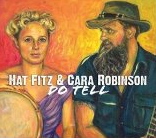 “Do Tell” by Hat Fitz & Cara Robinson is an incredibly frustrating album; there are some sublime moments, but there are a couple of complete clunkers as well. Just as you’re starting to really appreciate the musicianship and vocals, along comes a song which seems to have bypassed the quality control process completely; but more about that later. Hat Fitz is an Australian blues veteran who met his wife, Cara Robinson, a soul singer who has toured with Corinne Bailey-Rae and Jamiroquai, at an event in Ireland. Since they got together, musically and romantically, they have developed a compelling live presence, with Cara supporting Fitz’s guitar and vocals with drums, washboard, fife, flute and acoustic guitar as well as providing a powerful second voice. Their recent material has moved away from traditional blues to include folkier and country elements which are all on display on “Do Tell”.
“Do Tell” by Hat Fitz & Cara Robinson is an incredibly frustrating album; there are some sublime moments, but there are a couple of complete clunkers as well. Just as you’re starting to really appreciate the musicianship and vocals, along comes a song which seems to have bypassed the quality control process completely; but more about that later. Hat Fitz is an Australian blues veteran who met his wife, Cara Robinson, a soul singer who has toured with Corinne Bailey-Rae and Jamiroquai, at an event in Ireland. Since they got together, musically and romantically, they have developed a compelling live presence, with Cara supporting Fitz’s guitar and vocals with drums, washboard, fife, flute and acoustic guitar as well as providing a powerful second voice. Their recent material has moved away from traditional blues to include folkier and country elements which are all on display on “Do Tell”.
The album opens with “Friday Night”, a finger-picked acoustic blues telling the story of various characters in a bar and is delivered by Cara Robinson with more than a hint of Janis Joplin. “Stray Hat” follows, a raw country blues with a Fitz vocal and some nice harmonica; so far, so good. “Gotta Love” is the first of the low points; the slow electric slide intro builds into an all-out stomper but the combination of the over-wrought Cara Robinson vocal and the slide guitar just doesn’t work. The title song follows and it’s a slow blues balled with a descending guitar riff; it’s also a love song to a beer fridge; that’s Australians for you. “Long Black Cloud” is superb; it’s a slow blues which sounds a lot like the late Jackie Leven. If only the whole album was this good.
“Excuse Me” is a fast electric blues with a Cara Robinson lead vocal, followed by “99.9”, a blues duet with finger-picked acoustic backing with a lyrical theme of broken promises. “Sister Sister” has a more country feel with a Cara Robinson vocal and some nice flute to bring a bit of variety. That’s four good songs in a row, so guess what? “Shakedown” is a stinker; Fitz and Cara’s vocals are fighting each other in the chorus and the melodic fife hook only seems to emphasise the discordance. The final song, “Coming Home” again shows good this album could have been; it has a bluegrass feel with very tight harmonies and some nice fiddle and banjo throughout.
As a whole, it’s a bit of a roller-coaster ride; the two songs which let the album down really shouldn’t have made the cut and they devalue some of the other excellent material on the album. I wish I knew why “Gotta Love” and “Shakedown” managed to actually get on to the album, but I guess someone must have thought they deserved to be there. Ignore those two songs and it’s a very good raw country blues album.
Out May 12 on Manhaton Records.
 What a great start we’ve had to 2014. We’ve already reviewed some cracking albums in various genres and now we’ve got another. “Dunfearing and the West Country High” is Phil Burdett’s first album to be released on Twickenham-based Drumfire Records and it’s very, very good. If you’ve seen Phil Burdett play live, you’ll know that he has a powerful, rich baritone voice and is an accomplished acoustic guitar player. He learned to play at the age of six, was in a pre-Depeche Mode band with Martin Gore and has pursued a winding and sometimes messy path through the music scene in the south-east of England ever since.
What a great start we’ve had to 2014. We’ve already reviewed some cracking albums in various genres and now we’ve got another. “Dunfearing and the West Country High” is Phil Burdett’s first album to be released on Twickenham-based Drumfire Records and it’s very, very good. If you’ve seen Phil Burdett play live, you’ll know that he has a powerful, rich baritone voice and is an accomplished acoustic guitar player. He learned to play at the age of six, was in a pre-Depeche Mode band with Martin Gore and has pursued a winding and sometimes messy path through the music scene in the south-east of England ever since.
It’s obvious from the first listen that Phil isn’t just a songwriter; he’s a true poet. You can find any number of musical influences listed in previous reviews but you should probably add James Joyce and Dylan Thomas to that list. A quick word of advice here, don’t download this album, buy the CD; the packaging, designed by Fish Inton, is gorgeous and contains a booklet full of evocative photos and all of the lyrics.
It’s usually a pretty easy job to explain the subject of a song, but it can be a real challenge on “Dunfearing…” as Phil slips sinuously between the mundane and mystical. Even a song as seemingly grounded as “Small Talk at Sullivan’s Diner” descends quickly from the simple narrative to a deeper and darker examination of tortured souls struggling to cope with real life. The songs with a clear narrative thread are inspired by the history of Cornwall and the West Country, “Gothic Miner” and “Fate of Pirates”, for example, while “New York City Call” and “Columbus and Hope” emphasise the area’s historical links with the New World. There’s a batch of songs (“First and Last”, “Song of the Lamp”, “See the Sunset Slow and Beckon True”, “Rimbaud’s Ghost, Chapel Street & Union” and “Winter Halls”) which take inspiration from Phil’s recent Cornish sojourn, and the fatalistic “It’s Where ye Have to Go”.
Which leaves the album’s closing song, “Night Horses of the Wireless Road” to take all of these strands and pull them into an epic, mythical, stream of unconsciousness. The entire album is lyrically dense (both in volume and meanings) and the final song typifies this with references to art, music and fables, before moving abruptly into harsh reality with the news of the death of Jackie Leven, to whose memory the album is dedicated. Musically, “Night Horses…”, has echoes of Neil Young with Crazy Horse at their most laid back or maybe even John Martyn at his best. It has the same unsettling, alienating effect as The Afghan Whigs’ 1996 album, “Black Love”, particularly the closer, “Faded”.
I’m not saying this is an easy listen, but it’s worth putting in the effort. You might even have to do a bit of research on phrases like “mise-en-abyme” (you can look it up for yourself) and some of the more obscure references. Phil’s rough-hewn baritone voice and acoustic guitar (with a hint of Johnny Cash at times) are sympathetically supported by John Bennett (guitars), Steve Stott (mandolin/fiddle), Russ Strothard (bass guitar), Jack Corder (drums), Dee Hepburn (piano), Colleen McCarthy (backing vocals), Wag Porter (fiddle) and Mark Elliott (percussion) throughout the album; the playing isn’t particularly showy, but it creates a perfect backdrop for the modern folk and slight country leanings of the songs.
If you want a particularly geeky fact to impress your friends with, there are nearly thirty drinking references in the album’s lyrics, including pub names, drink names and general drinking terms, including one reference to rehab; you can take what you like from that, but I’m guessing that Phil enjoys a beer. This is an album which visits some very dark places, but closes with a heartfelt farewell to a fellow troubadour as part one of the proposed “Secular Mystic Trilogy” closes.
Out Monday March 3rd on Drumfire Records (DRMFR016).


